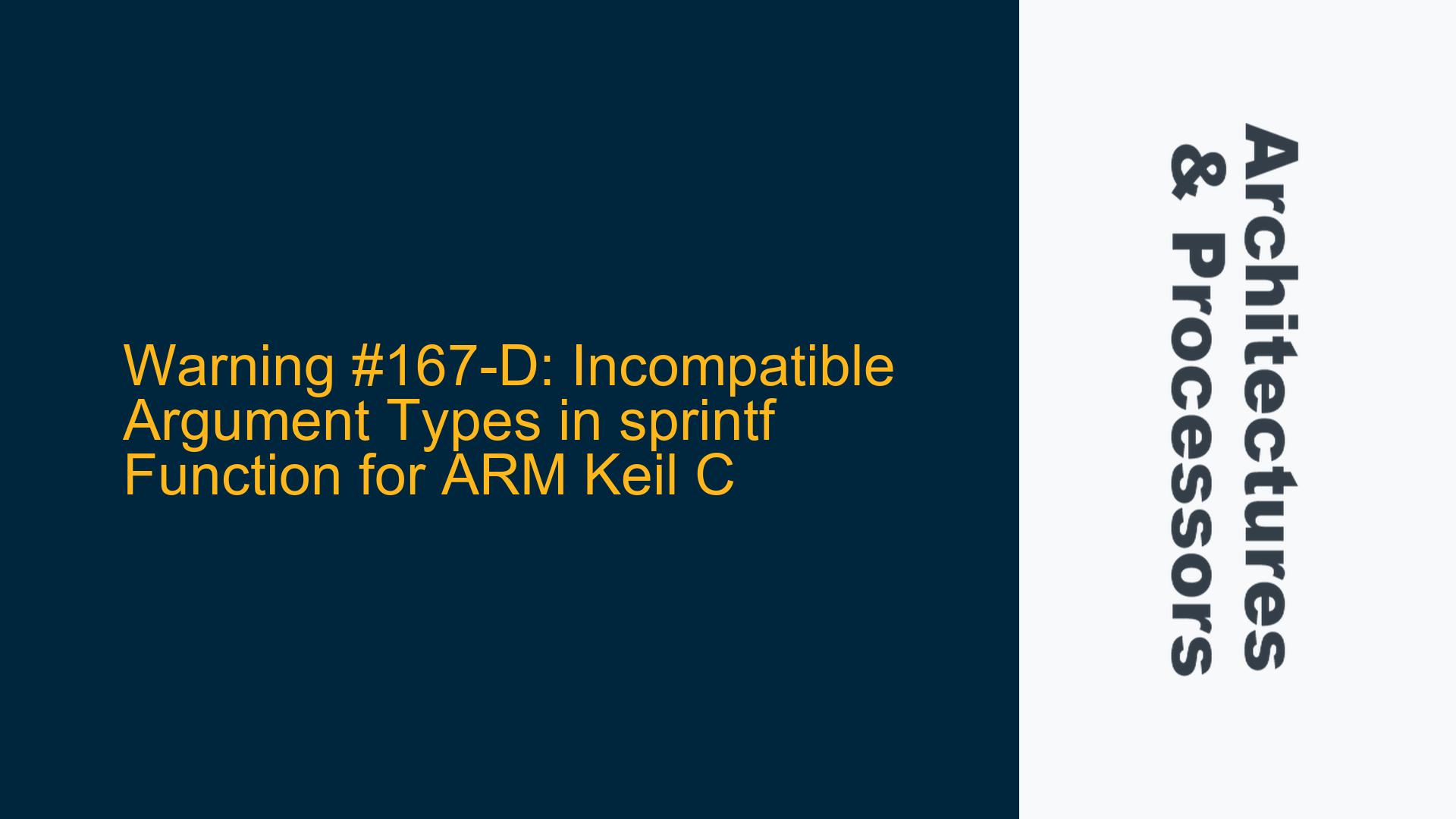ARM Keil C Compiler Warning: Incompatible Argument Types in sprintf Function
The issue at hand revolves around a specific compiler warning (#167-D) generated by the ARM Keil C compiler when using the sprintf function. The warning indicates that the argument of type BYTE * is incompatible with the parameter of type char *restrict. This warning is particularly perplexing because the code executes correctly despite the warning, and similar code does not produce warnings in other compilers like Borland C++ or Keil C for C51. The core of the problem lies in the type compatibility between the buffer used in the sprintf function and the expected parameter type.
Understanding the Warning: Type Mismatch in sprintf Function
The sprintf function in C is used to format and store a series of characters and values in a buffer. The function signature for sprintf is as follows:
int sprintf(char *restrict str, const char *restrict format, ...);
The first argument, str, is a pointer to a buffer where the resulting string is stored. The type of this buffer is char *restrict, which means it is a pointer to a character array with the restrict keyword indicating that the pointer is the only way to access the memory it points to during its lifetime.
In the provided code, the buffer BUFF is used as the first argument to sprintf. The warning arises because the type of BUFF is BYTE *, which is not directly compatible with char *restrict. The BYTE type is typically defined as an unsigned char, and while char and unsigned char are similar, they are not the same in terms of type compatibility, especially when the restrict qualifier is involved.
Possible Causes: Type Definitions and Compiler-Specific Behavior
The root cause of the warning can be traced back to the definition of the BUFF variable and how the ARM Keil C compiler handles type compatibility. There are several factors that could contribute to this issue:
-
Type Definition of BUFF: The
BUFFvariable is likely defined as aBYTE *, which is an alias forunsigned char *. Thesprintffunction expects achar *restricttype, and whileunsigned char *andchar *are similar, they are not identical in the eyes of the compiler, especially when therestrictqualifier is involved. -
Compiler-Specific Behavior: Different compilers have different levels of strictness when it comes to type compatibility. The ARM Keil C compiler is more stringent in enforcing type compatibility, especially with the
restrictqualifier, which is why the warning is generated. In contrast, Borland C++ and Keil C for C51 may be more lenient, allowing the code to compile without warnings. -
Scope and Lifetime of BUFF: The warning disappears when
BUFF3is defined outside the function, suggesting that the scope and lifetime of the buffer may also play a role in how the compiler handles type compatibility. WhenBUFF3is defined outside the function, the compiler may have more information about the buffer’s lifetime, allowing it to resolve the type compatibility issue. -
Use of
restrictQualifier: Therestrictqualifier in thesprintffunction signature indicates that the pointer is the only way to access the memory it points to during its lifetime. This qualifier can affect how the compiler handles type compatibility, especially when dealing with different types of pointers (e.g.,unsigned char *vs.char *).
Troubleshooting Steps, Solutions & Fixes: Resolving the Type Mismatch Warning
To resolve the warning, several steps can be taken to ensure that the type of the buffer used in the sprintf function is compatible with the expected char *restrict type. Below are detailed troubleshooting steps and solutions:
-
Explicit Type Casting: One of the simplest solutions is to explicitly cast the
BUFFvariable to achar *type when passing it to thesprintffunction. This ensures that the compiler sees the buffer as the correct type, eliminating the warning. For example:sprintf ((char *)BUFF, "%02d:%02d:%02d", (unsigned)RTC8583.HOUR, (unsigned)RTC8583.MIN, (unsigned)RTC8583.SEC);This explicit cast tells the compiler that
BUFFshould be treated as achar *type, which matches the expected parameter type ofsprintf. -
Change the Type of BUFF: Another approach is to change the type of
BUFFfromBYTE *tochar *. This ensures that the buffer is always of the correct type, eliminating the need for type casting. For example:char BUFF[10]; // Define BUFF as a char array sprintf (BUFF, "%02d:%02d:%02d", (unsigned)RTC8583.HOUR, (unsigned)RTC8583.MIN, (unsigned)RTC8583.SEC);By defining
BUFFas achararray, the buffer is inherently compatible with thesprintffunction, and no warning will be generated. -
Use a Temporary Buffer: If changing the type of
BUFFis not feasible, a temporary buffer of typechar *can be used to store the formatted string, and then the contents can be copied toBUFF. This approach ensures that thesprintffunction receives a buffer of the correct type, while still allowingBUFFto remain asBYTE *. For example:char tempBuff[10]; sprintf (tempBuff, "%02d:%02d:%02d", (unsigned)RTC8583.HOUR, (unsigned)RTC8583.MIN, (unsigned)RTC8583.SEC); memcpy(BUFF, tempBuff, sizeof(tempBuff));This method introduces an additional step of copying the formatted string from the temporary buffer to
BUFF, but it ensures that thesprintffunction operates on a buffer of the correct type. -
Compiler Flags and Configuration: In some cases, the warning can be suppressed by adjusting compiler flags or configuration settings. However, this approach is not recommended as it masks the underlying issue rather than resolving it. It is better to address the type compatibility issue directly rather than suppressing the warning.
-
Reviewing the Use of
restrictQualifier: If therestrictqualifier is not strictly necessary for the application, it can be removed from the function signature. However, this is generally not advisable, as therestrictqualifier provides important information to the compiler about pointer aliasing, which can lead to more optimized code. Removing therestrictqualifier should only be considered if the performance impact is negligible and the warning cannot be resolved through other means. -
Defining BUFF Outside the Function: As observed in the discussion, defining
BUFFoutside the function can sometimes resolve the warning. This is likely because the compiler has more information about the buffer’s lifetime and can better handle type compatibility. If this approach is feasible, it can be a simple solution to the problem. For example:char BUFF[10]; // Define BUFF outside the function void showTime() { sprintf (BUFF, "%02d:%02d:%02d", (unsigned)RTC8583.HOUR, (unsigned)RTC8583.MIN, (unsigned)RTC8583.SEC); }By defining
BUFFoutside the function, the compiler can better manage the buffer’s type and lifetime, potentially resolving the warning.
Conclusion
The warning (#167-D) generated by the ARM Keil C compiler when using the sprintf function is a result of a type mismatch between the BYTE * type of the buffer and the expected char *restrict type. This issue can be resolved through several approaches, including explicit type casting, changing the type of the buffer, using a temporary buffer, or defining the buffer outside the function. Each of these solutions addresses the type compatibility issue in a different way, allowing the code to compile without warnings while maintaining correct functionality.
By understanding the underlying causes of the warning and applying the appropriate fixes, developers can ensure that their code is both clean and efficient, avoiding potential issues that could arise from type mismatches. The ARM Keil C compiler’s strict type checking, while sometimes inconvenient, ultimately leads to more robust and reliable code.






